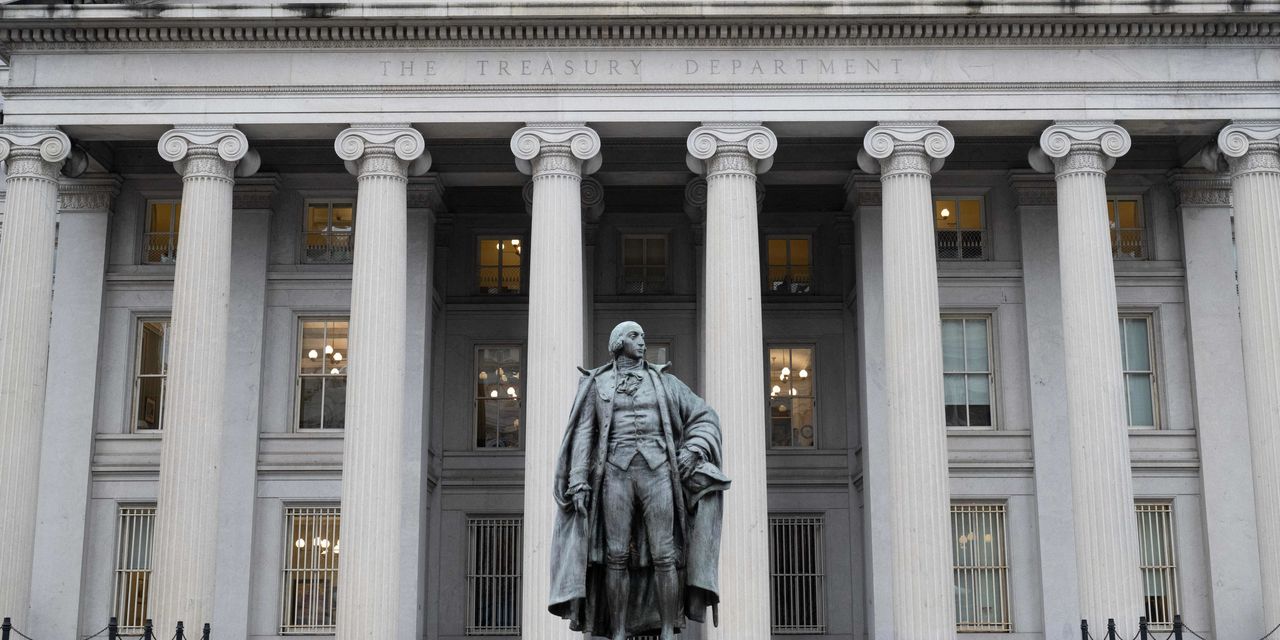Fitch Ratings has downgraded the U.S. government’s long-term foreign-currency default rating to AA+ from AAA.
The ratings agency said Tuesday the downgrade on the U.S.’s primary rating reflects “the expected fiscal deterioration over the next three years, a high and growing general government debt burden, and the erosion of governance relative to ‘AA’ and ‘AAA’ rated peers over the last two decades.”
Fitch also cited repeated debt limit standoffs and last-minute resolutions.
The downgrade comes more than two months after Washington lawmakers struck a deal in late May to lift the country’s borrowing limit. That drawn-out fight had raised the risk of default and prompted Fitch to put the U.S. credit rating on its negative watch list, where it remained even after the agreement was finalized.
It wasn’t immediately clear why the firm decided to formally downgrade on Tuesday. The debt-ceiling deal passed at the start of the summer with bipartisan support, lifted the debt limit for two years, and capped some federal spending in the meantime. And the economy overall has appeared to be on firmer ground in recent weeks, with inflation slowing and growth coming in stronger than expected.
“I am very puzzled by many aspects of this announcement, as well as by the timing,” economist Mohamed El-Erian, chief economic advisor at
Allianz
and chair of Gramercy Funds Management, wrote shortly after the announcement.
The move was immediately criticized by the White House, which said in a statement that it strongly disagreed with the decision.
Treasury Secretary Janet Yellen said the move was arbitrary and based on outdated data. She noted that several factors on which Fitch made its decision—including governance concerns—“have shown improvement over the course of this administration.”
In its decision, Fitch noted that unlike most of its peers, the U.S. government lacks a medium-term fiscal framework and has a complex budgeting process. Those factors, along with economic shocks, tax cuts, and new spending initiatives, have contributed to “successive debt increases over the last decade.”
The ratings agency also pointed out that only limited progress has been made in tackling challenges related to rising Social Security and Medicare costs, which are on track to continue soaring as the population ages.
Fitch’s decision means two of the three major credit ratings firms now have a less than top-tier rating on U.S. debt, with only Moody’s Investors Service holding it at AAA and stable. Standard & Poor’s downgraded the U.S. rating to AA+ after a 2011 fight over the debt ceiling and has yet to readjust it.
That means that on average, the U.S. now holds a rating below AAA—a fact that wasn’t true when only one agency had downgraded it, but is now that two have.
The decline in the average could carry some impact if investors or major funds have provisions regarding average ratings, said Wendy Edelberg, a senior fellow in economic studies at the Brookings Institution. But even then, she adds, given how highly rated U.S. debt remains, the impact could be muted.
Other economists dismissed the potential for economic and market impact even further. Some highlighted how Fitch isn’t as closely watched as Moody’s or S&P, whose own downgrade more than a decade ago ultimately mattered little in the long run.
“Investors are sophisticated and don’t take their cues from ratings firms on something as well understood as U.S. Treasuries,” says Jason Furman, a Harvard economist. “I expect this to have no economic impact, more of a political talking point.”
Indeed, the downgrade immediately emerged as a flashpoint in Washington, where Democratic lawmakers and the White House pinned the blame on Republicans for, as Senate Majority Leader Chuck Schumer put it, “reckless brinkmanship and flirtation with default.”
Over the longer term, the decision could provide ammunition to lawmakers on both sides of the aisle who want to see the government address the size of its debt. Maya MacGuineas, president of the nonpartisan Committee for a Responsible Federal Budget, said in a statement Tuesday evening that Fitch’s move should serve to highlight how the U.S. is on an unsustainable fiscal path.
“Today’s downgrade should be a wake-up call,” MacGuineas said. “We need to get our country’s fiscal and political house in order.”
Write to Megan Cassella at [email protected] and Janet H. Cho at [email protected]
Read the full article here





